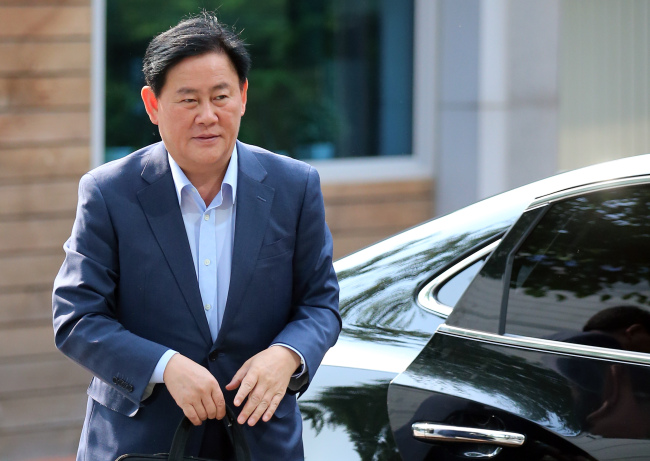Deputy Prime Minister and Finance Minister-nominee Choi Kyung-hwan stands at a crossroads as he will soon have to make tough decisions and policy recommendations for President Park Geun-hye to revitalize the economy, which has become sluggish following the ferry disaster in April.
A slew of economic tasks await the incoming deputy prime minister after his parliamentary confirmation hearing, and among sensitive issues he will have to address are taxes and loan-related regulations for the housing market and slow consumption.
A slew of economic tasks await the incoming deputy prime minister after his parliamentary confirmation hearing, and among sensitive issues he will have to address are taxes and loan-related regulations for the housing market and slow consumption.

Already, his remarks are drawing increasing attention, as well as opposition, after he expressed willingness to deregulate loan assessment and qualification measures such as loan-to-value and debt-to-income ratios for borrowers to boost the lackluster real estate market.
Choi is expected to be caught in the crossfire between two political parties and face mounting criticism regarding his policy directions for South Korea ― whether they concern taxes, deregulations, administrative reform, shortfalls in state tax revenues, increasing disparity or appropriating budgets.
He certainly will have a lot of things to fix and handle, not to mention Korea’s won-dollar exchange rate and export policies that would have to be implemented in line with efforts to get the country growing 4 percent annually again.
It is, without a doubt, important that Korea achieve its goal, and create as many jobs as possible and reach its target of a 70 percent employment rate, either through lending deregulations or tax revisions.
But the incoming economic administration, led by Choi and newly appointed senior presidential economic advisor Ahn Jong-beom, needs to look beyond statistics, targets and dollar signs by encouraging growth qualitatively, not quantitatively.
Whereas their outgoing predecessors Finance Minister Hyun Oh-seok and presidential aide Cho Won-dong had little success in calming tension concerning national debt, income tax revisions and welfare financing, Choi and Ahn must learn from their predecessors’ mistakes, and correct them in line with the president’s reform drive, and especially in the best interests of the middle class.
It will take more than what they learned from economic textbooks during their postgraduate years to manage Asia’s fourth-largest economy.
If the ferry disaster has taught Korea anything, it is that anything could happen to put the brakes on the economy. And that the economy does not always go as planned or according to equations and forecasts since there will always be negative factors such as the U.S. monetary stimulus cuts or the Ukrainian crisis that could catch the market off guard.
The time is ripe not only for Choi but the new Cabinet to seriously resolve growing socioeconomic problems by seeking a bipartisan agreement through effective communication and diplomacy with lawmakers, the private sector and especially their boss ― the people of this country, not the president.
There will never be an easy path to gain a full consensus because democracy is difficult. But the foundation of creating a free economy relies on confidence and governance that can only be gained when a wide variety of people can achieve happiness.
By Park Hyong-ki (hkp@heraldcorp.com)







![[Graphic News] More Koreans say they plan long-distance trips this year](http://res.heraldm.com/phpwas/restmb_idxmake.php?idx=644&simg=/content/image/2024/04/17/20240417050828_0.gif&u=)
![[KH Explains] Hyundai's full hybrid edge to pay off amid slow transition to pure EVs](http://res.heraldm.com/phpwas/restmb_idxmake.php?idx=644&simg=/content/image/2024/04/18/20240418050645_0.jpg&u=20240419100350)





![[From the Scene] Monks, Buddhists hail return of remains of Buddhas](http://res.heraldm.com/phpwas/restmb_idxmake.php?idx=652&simg=/content/image/2024/04/19/20240419050617_0.jpg&u=20240419175937)

![[KH Explains] Hyundai's full hybrid edge to pay off amid slow transition to pure EVs](http://res.heraldm.com/phpwas/restmb_idxmake.php?idx=652&simg=/content/image/2024/04/18/20240418050645_0.jpg&u=20240419100350)

![[Today’s K-pop] Illit drops debut single remix](http://res.heraldm.com/phpwas/restmb_idxmake.php?idx=642&simg=/content/image/2024/04/19/20240419050612_0.jpg&u=)